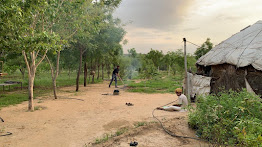Pledge to Plant: SankalpTaru
The sky is overcast and one can imagine the song “ghanana ghanana ghir ghir aayee badara” from the movie Lagaan, as the surroundings looked lush with trees and saplings of all sizes covering the pale sand over ten to twelve acres. There are trees of many varieties like Neem, Khejri, Acacia, desert teak and fruiting trees like pomegranate, among other native species. As the person in the video indicates there is a temple and sand dunes intact outside, in the vast, otherwise barren landscape of the Thar desert around Barmer district of Rajasthan, one can’t help but wonder why the landscape is so lush inside the compound, even attracting rain, and wildlife such as peacocks and deer.


The video depicts a forest adopted by philanthropists Vivek and Vandana Sharma, who, through their foundation have given back to the community through multiple projects in New England and beyond. This project in Rajasthan, and another one in Vidarbha, Maharashtra, is through SankalpTaru (Sankalp:Pledge, Taru:Plants/Trees), an Indian non-profit organization with a mission of creating environmental and social impact through tree plantations which can be pledged via their hi-tech platform. The platform is cool, in that, in three easy steps one can pledge to plant a tree, and SankalpTaru will manage the rest including planting the tree at the requested location, provide an emotional connect to the tree by updating the donor about the health and growth of the tree(s) over multiple years and allow one to geotag the location of the actual tree planted.
In the eight years since its inception in 2012, when SankalpTaru started with two locations, they are now close to reaching their million tree milestone in twenty-one states; they are helping 25000 farmers through their Rural Livelihood Support Program; they have reached 1500 schools through their Clean Green School Program; they are working in 35 cities in their Urban Plantation Program; and tens of sites in their Barren Land/Community Plantation Program - including the two mentioned before and one in the Aravallis, which has become a mini-wildlife sanctuary over twenty hectares.
Apurva Bhandari, the CEO of SankalpTaru was born and raised in the Himalayas, in Gopeshwar near Badrinath, and always aware of the treasure Mother Nature gave us in the form of trees and rivers. He took an orthogonal detour to work for a few years in Bharat Petroleum and in IT in Philadelphia, but returned to his calling for the cause and established Sankalp Taru. He believes in “Prakruti Rakshati Rakshita” (Nature Protects herself if she is protected).
Apurva looks at SankalpTaru as a technology non-profit with a mission. It took the company about one year to develop the transparent and convenient platform to connect and enable environmental enthusiasts from all over the world to make an impact on the areas which needed development the most. The projects use cutting edge technologies such as IoT (Internet of Things) sensors to manage the humidity, temperature and soil moisture, which increases the rate of survival of the plants and yields higher produce, without the need of active human involvement all the time. They use seed-bombing drones, which they call Beejyaan, to plant seeds in tough terrains like Tehri and Ladakh. They have introduced solar power irrigation systems to strengthen their commitment to sustainability. Using a micro-irrigation system like ones being used in arid climates in Israel, some of their projects directly reach the roots of the saplings, using only 1/4 th of the water required otherwise. They use water harvesting and man made ponds and lakes to collect water. They work with research teams on the ground to find local and native species which will thrive in their natural habitat and will not disturb the ecological balance. Having a technical and scientific mindset has helped the organization achieve a higher survival of their plantation projects.
Though the tree plantation projects have an environmental feel, Apurva says, they look to be making some sort of social and economic impact as well. The plantations in schools are accompanied by an environmental curriculum that runs through the school year. The projects on barren land have brought back wildlife and rain. They plant fruit bearing trees, which include apples, oranges, pomegranate, lemons, alma, mango, just to name a few varieties, which are expected to provide a livelihood to the farmers whose land is used for the plantation. In an inspiring example of giving back, in the project in Vidarbha, Maharashtra, the farmers have pledged to donate a part of their first produce to local schools.
They worked alongside Sonam Wangchuk, who was a flash flood victim from Vanla, Ladakh, in restoring his land, which now has a thriving Apple and Apricot orchard.
Apurva’s work through SankalpTaru reminded me of the story of Johnny Appleseed. John Chapman, who was born in Leominster, Massachusetts, not far from where we live, spent a better part of his life in the late 1700s to early 1800s, planting apple orchards in states that now fall under the rust-belt. To me SankalpTaru looks like a 21st century Johnny Appleseed, who took this further to find natively grown fruit and open it up to all of us who want to do our bit in restoring Nature, as she helps the needy. Cute little Wishy can make your wish come true. Send mail to wishy@sankalptaru.org for your Sankalp.
I noticed how the small spruce tree in my yard is spreading and growing. It was a gift from Vandana Sharma, like the ones she gave many others, a symbol of their commitment to the environment. I look at the video Vivek and Vandana shared and the introduction to this fantastic organization SankalpTaru, which is growing and thriving at a much larger scale. When I asked Apurva where he sees his organization in five years, his response was that the platform and the model are generic enough to replicate anywhere, so first replicate globally, then on outer planets. Time to book a flight to Mars, Mr. Bhandari !
Vandana and Vivek Sharma Foundation : https://youtu.be/7X1AVOeGrQs
SankalpTaru : https://sankalptaru.org/



















Comments
Post a Comment